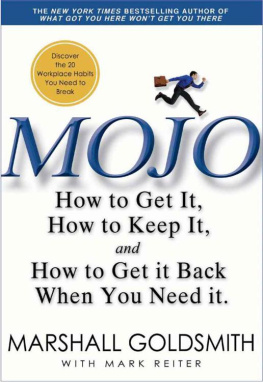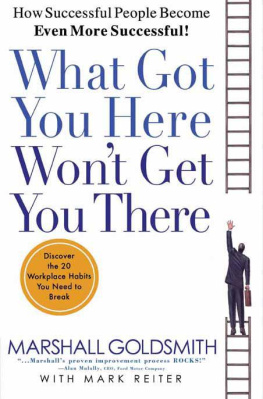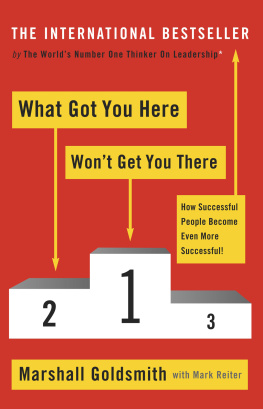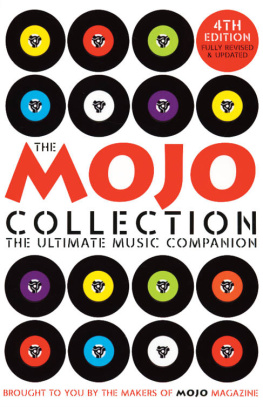Mojo
How to Get It,
How to Keep It,
How to Get It Back if You Lose It
Marshall Goldsmith
with Mark Reiter

Mojo is dedicated to my friend, co-writer,
and agent Mark Reiter. Is my life better
because I have met Mark Reiter?
In more ways than I can even count!
Thank you, Mark!
I am awake.
B UDDHA
Contents
You and Your Mojo
Mojo, You, and Me
Measuring Your Mojo
The Mojo Paradox
The Building Blocks of Mojo
Identity: Who Do You Think You Are?
Achievement: What Have You Done Lately?
Reputation: Who Do People Think You Are?
Acceptance: When Can You Let Go?
Mojo Killers
Four Pointless Arguments
That Job Is Gone!
Your Mojo Tool Kit
Change You or Change It
Identity: Making Sense of Who You Are
Establish Criteria That Matter to You
Find Out Where Youre Living
Be the Optimist in the Room
Take Away One Thing
Achievement: Making It Easier to Get Things Done
Rebuild One Brick at a Time
Live Your Mission in the Small Moments Too
Swim in the Blue Water
Reputation: Taking Control of Your Story
When to Stay, When to Go
Hello, Good-bye
Adopt a Metrics System
Reduce This Number
Acceptance: Change What You Can, Let Go of What You Cant
Influence Up as Well as Down
Name It, Frame It, Claim It
Give Your Friends a Lifetime Pass
Connecting Inside to Outside
Going Beyond Self-Help
You Go First
The Mojo Survey: Measuring Short-Term Satisfaction (Happiness) and Long-Term Benefit (Meaning)
What the Mojo Survey Results Mean
Mojo would not have been possible without the help and support of many wonderful people:
My wife, Lyda, son, Bryan, and daughter, Kelly, who manage to love me in spite of my crazy writing and traveling schedule.
My wonderful coaching and leadership development clientswho have taught me far more than I have ever taught them. I feel so privileged to work with many of the most successful and inspirational leaders in the world. As good as they arethey are still striving to get better!
The wonderful teachers who have helped me: David Allen, Richard Beckhard, Warren Bennis, Niko Canner, Fred Case, Peter Drucker, Keith Ferrazzi, Vijay Govindarajan, Phil Harkins, Sally Helgesen, Paul Hersey, Frances Hesselbein, Jon Katzenbach, Bev Kaye, Gifford Pinchot, CK Prahalad, Mark Thompson, Dave Ulrich, and John Ying.
My friend and editor, Sarah McArthur, who endlessly reviews everything I write and provides valuable assistance.
Alliant International University, Marshall Goldsmith School of Managementand the Global Leadership Development Center team: Chris Coffey, Ron Curtis, Jim Goodrich, Maya Hu-Chan, Bill Hawkins, Tom Heinselman, Carlos Marin, Howard Morgan, Jim Moore, Linda Sharkey, and Frank Wagner.
Jackson & Cokerleaders in physician recruitment, whose research is helping to shape my teaching about Mojo.
Extended DISCespecially Markku Kauppinen, who is conducting great research on identity and Mojo.
HyperionThis is my second book with the wonderful folks at Hyperion. It started with two men named Will: Will Schwalbe, who endorsed the idea instantaneously but left to find his Mojo as an Internet entrepreneur; and Will Balliett, who was instrumental in shaping its contents and reminding me to get words on paper. Eventually, it landed in the calm, capable hands of Brendan Duffy. The support of Ellen Archer and Kristin Kiser cannot be underestimated.
The Center for Leadership Studieswhich has taught me as well as supported my work.
Dartmouths Tuck School, Michigans Ross School, the Scarlett Leadership Institute, HarvardBusiness.org, BusinessWeek.com, HuffingtonPost.com, Dale Carnegie, Linkage, the Conference Board, AMA, ASTD, HRPS, SHRM, ChartHouse, Talent Management, and the Institute for Management Studieswhich have helped my work reach millions of leaders.
Heidrick & Struggleswhich has helped me shape my thinking about leadership development.
The inspirational men and women in the military and human services organizations who serve every daynot for money or glory, but to help others.
Buddhawho knew more about human behavior two and a half centuries ago than anyone I have ever met in my lifetime.
And finally, you, my readers. Your support means more to me than you will ever know. If you ever want to talk, please send me a note at Marshall@MarshallGoldsmith.com. I cant get back to you instantly, but I almost always get back eventually.
Despite all of the contributions of these wonderful folks, I am sure that this book, like everything else I have done, has a few dumb remarks. For these, I take responsibility and apologize to you. As Buddha said so wellplease use what works for you and just let go of the rest.
You and Your Mojo
Mojo, You, and Me
A few years ago I attended a girls high school basketball game with my friend Mel and his family. Mels daughter Chrissy was her teams starting point guard. It was the league championship and we were all hoping for the best.
But in the first half, Chrissy and her teammates could do nothing right. As they headed toward the locker room at halftime, they were down by seventeen points, their shoulders were stooped, and I could see a couple teammates arguing with each other. The coach was swinging his clipboard like a traffic cop, hurrying the girls as if he were afraid things might get worse if they didnt get off the court as quickly as possible. The game was so lopsided that I was dreading the second half. I could see Mel thinking the same thing: Please Lord, no more of this.
But we reminded ourselves that anythings possible, that Chrissys team could claw back and at least make the game interesting. And thats precisely what happened.
Chrissy and her teammates opened the half with a couple of three-point shots and a steal that led to an easy layup. In what seemed the blink of an eye, a daunting lead of seventeen points had been trimmed to a more manageable nine points. And Chrissys team didnt let up. They continued to chip away until they trailed by only three. The opposing teams coach finally called a time-out and everyone on our side stood up to applaud our teams thrilling comeback.
Mel turned to me and said, Were gonna win this game. And at that moment, I knew exactly what he meant.
The evidence was on the court. The entire tone of the game had changed. While in the first half Chrissys team had been confused, now they were prowling the court with a renewed sense of urgency and a little more swagger. You could see it in their eyes. Each player was thinking, Give me the ball. I can do it. You could see the change come over the other team as well. While in the first half they were operating in a smooth, wordless flow as they built up their enormous lead, now they were tense, bickering with each other, whining about the referees, and turning more frequently to the bench, where their coach was gesturing wildly and trying to settle them down.
Chrissys team did, in fact, go on to win the game. Who can say why a confused, dispirited team emerged from halftime with a different attitude? Perhaps they found a communal purpose in the embarrassment of being down by seventeen points. Perhaps their coach gave them a new game plan. Or maybe they won the game simply because of the boost of confidence that came with the good fortune of starting the second half with a string of small successes that produced eight unanswered points. Maybe all of these factors combined to lift the teams spirit from negative to positive.







